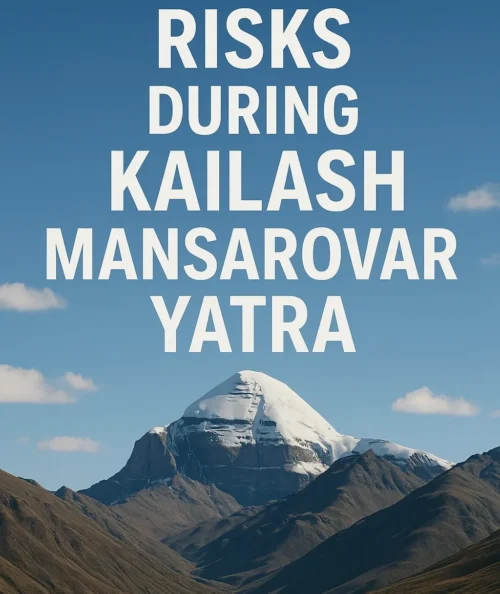

The Kailash Mansarovar Yatra is not just a pilgrimage—it's a faith test, a trial of endurance, and a test of internal strength. But hidden deep in the far-flung Himalayan tract of Tibet, the journey is as dangerous as it is deep. Although thousands of pilgrims complete the Yatra every year, not everyone returns with nothing but memories. Grasping the perils of undertaking the Kailash Mansarovar Yatra helps prepare both the body and mind for one of the most sacred and difficult religious pilgrimages on the planet. In this detailed blog, you can easily aware of risks during Kailash Mansarovar Yatra.
The landscape of Tibet and Mansarovar is also rugged, with frequent rock pathways, steep cliffs, and dirt roads. The absence of infrastructure in such remote areas implies even minor mishaps turn into serious problems.
Check out our Kailash Mansarovar Yatra Package for a well-organized and smooth journey.
Sunny moments followed by a sudden flurry of snow or icy gusts are common. Sudden dips in temperature are also typical, particularly in the Parikrama (circling) around Mount Kailash.
Altitude sickness is, in fact, the most frequent and severe medical risk; consequently, they present with headaches, dizziness, nausea, and shortness of breath.
Severe cases may result in High Altitude Pulmonary Edema (HAPE) or High Altitude Cerebral Edema (HACE), which are fatal if left untreated.
Diabetes, hypertension, and heart conditions can be worsened at high altitudes. A complete medical examination is a prerequisite before taking off.
Check out our Best Kailash Mansarovar Yatra Package for a well-organized and smooth journey.
Even the physically fittest may experience, however, the trek to be strenuous. Indeed, extended walking hours, climbing up slopes, and low oxygen concentration, consequently, strain each muscle and gasp of breath.
Though snow-melt and regional water may appear to be pure, waterborne illnesses such as diarrhea or stomach infection are prevalent because of inadequate sanitation.
While trekking, particularly in Tibet, the food is simple and cyclical. Malnourishment can cause fatigue or gastrointestinal disturbances.
Tibet is controlled by China. Consequently, political stress may result in abrupt cancellations of permits—even after paying and planning ahead.
Even after crossing the Nepal-China border, unexpected things such as political unrest or pandemic notices can close the border without warning.
Check out our Kailash Mansarovar Yatra Package from Kathmandu for a well-organized journey.
Mobile connection is not available in most areas beyond Simikot and Hilsa. This isolation increases stress in case of emergencies.
Even thoroughly planned itineraries get disrupted by landslides, vehicle failure, or broken roads; consequently, this results in delays.
Monsoons bring regular landslides along the Nepalese part of the journey. Roads may be closed for days.
Tibet and Nepal are geologically active regions. The 2015 Nepal earthquake interrupted Yatra paths for years.
Wearing shoes at sacred locations or talking loudly in front of temples will offend locals and monks. Respect is important.
Some monasteries and sites prohibit photography altogether. Fines and device confiscation can be the consequence.
Check out our Kailash Mansarovar Yatra Package for a well-organized and smooth journey.
Most budget operators entice low prices at the expense of safety, food, and permits. Check their credentials always.
Watch out for last-minute cancellations without refund or poor explanations. Read the small print on refund policies.
Neither English nor Hindi is widely spoken in Tibet. Miscommunication in medical emergencies can prove to be lethal.
Non-verbal cues or requests might be misinterpreted; therefore, make use of a translator app or, alternatively, bring a bilingual guide along.
Snow, rain, and loose rocks render the 3-day Parikrama trek hazardous. Consequently, a single slip would result in grievous injury.
In other segments, emergency assistance or rescue vehicles are hours away—arrange in advance with your operator.
Helicopter flights through Simikot or Hilsa tend to be delayed or canceled when there is poor visibility or wind. A Kailash Mansarovar Yatra tour package by helicopter can significantly reduce travel time while still offering breathtaking aerial views of the region.
Fewer than a dozen helicopters serve these areas. In case you get stranded, you can end up waiting 1–2 days for rescue.
Small mistakes in your passport or visa can, therefore, stop border crossing. Consequently, check double on all points beforehand.
Even with all approvals, China can cancel group visas due to political or security concerns.
Purchase high-altitude insurance that includes medical evacuation. Additionally, screen for high blood pressure, asthma, and heart conditions.
Opt for Epic Yatra with full services including permits, oxygen, meals, and bilingual guides.
Keep emergency numbers, power bank, and satellite phone if available. Identify the closest embassy or consulate address.
1. Are there medical facilities along the trek?
Basic facilities only. Authorities must evacuate serious problems to Kathmandu or Delhi.
2. Do I need to take travel insurance?
Yes, please. Additionally, make sure it includes high altitude, helicopter evacuation, and, furthermore, medical costs.
3. How much should I be fit?
You will be able to walk 5–10 km a day at high altitude. Medical clearance is required.
4. May I use my cell phone on the trip?
Only close to the Nepal side. Tibet has little coverage and minimal internet.
5. Are helicopter flights safe?
Yes, but weather dependent. Delays are common.
6. What are some scams that I should avoid?
Watch out for unregistered agents, fake permits, and unsubstantiated promises, such as luxury accommodations in Tibet. Furthermore, it is essential to remain vigilant and cautious to avoid potential scams and misleading information.
With planning, awareness, and faith in seasoned agencies, you can control the perils of the Kailash Mansarovar Yatra. This divine pilgrimage, while fraught with difficulties, also promises profound spiritual dividends. Welcome the pilgrimage with eyes wide open and faith in your heart.